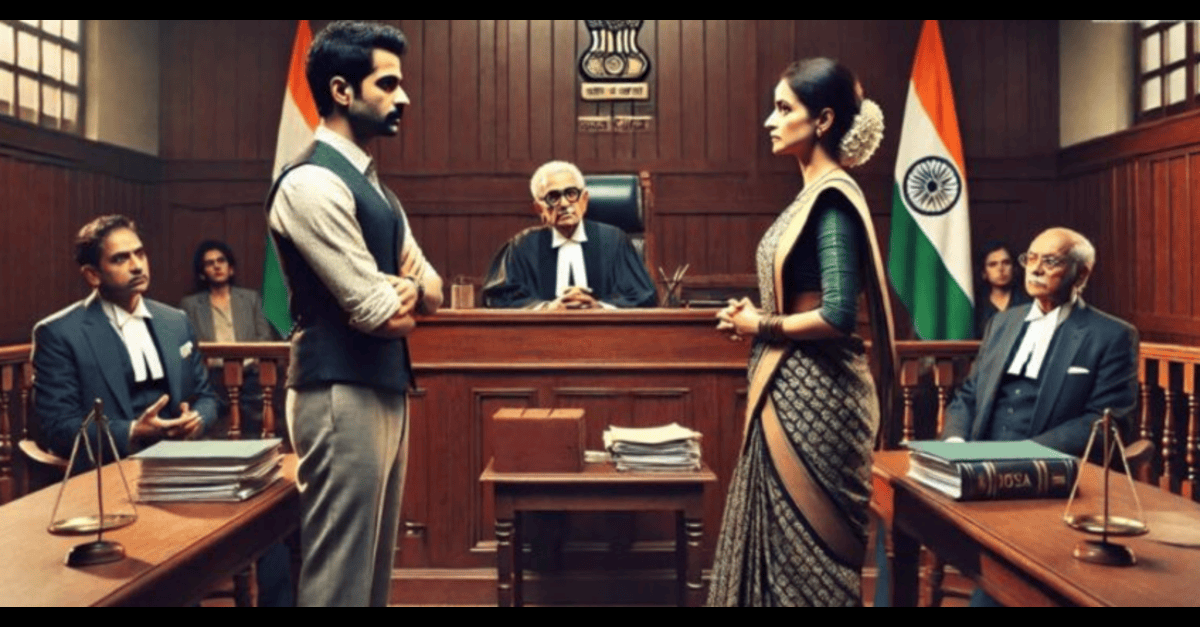Case Name: Dara Lakshmi Narayana & Ors v. State of Telengana & Anr.
Case Number: Criminal Appeal of 2024 (Arising out of Special Leave Petition (Criminal) No. 16239 of 2024
Date: December 10, 2024
Quorum: Hon’ble Mrs. Justice B.V Nagarathna, Hon’ble Mr. Justice Nongmeikapam Kotiswar Singh
FACTS OF THE CASE
The case started off when appellant No.1 had filed a police complaint in response to respondent No. 2 leaving their matrimonial home and two children. When investigated her whereabouts, it was found that she was living with a third party, Govindan, with whom she had been talking over the telephone for a period of ten days. Despite promising she would never do such an act she once again left their home leaving behind their two children.
The appellant, having lost hope in the marriage, issued a legal notice to respondent No. 2 seeking divorce by mutual consent. In retaliation to this, respondent No.2 registered an FIR with the Neredmet Police Station, Rachakonda under Sections 498A of the Indian Penal Code, 1860 and Section 3 and Section 4 of the Dowry Prohibition Act, 1961. The appellants No.1 to 6, aggrieved by the order dated February 16th, 2022 passed by the High Court for the State of Telengana, which refused to quash the FIR filed by respondent No.2 against the appellants, they, in response, have preferred an appeal.
ISSUE OF THE CASE
- Whether the High Court erred in refusing to quash the FIR despite vague and omnibus allegations?
- Whether the FIR and the subsequent criminal proceedings under Section 498A IPC were legitimate or motivated by mala fide intent?
LEGAL PROVISIONS
- Section 498A of the Indian Penal Code, 1860
Criminalizes cruelty by a husband or his relatives against his wife, including harassment related to dowry
- Section 3 and Section 4 of the Dowry Prohibition Act, 1961
Penalizes giving, taking, or demanding dowry
- Section 482 of the Criminal Procedure Code, 1973
Empowers the High Court to quash proceedings to prevent abuse of the court’s process
- Case Laws
- Arnesh Kumar vs. State of Bihar (2014) 8 SCC 273
- State of Haryana vs. Bhajan Lal, 1992 Supp (1) SCC 335 (“Bhajan Lal”)
- G.V. Rao vs. L.H.V. Prasad, (2000) 3 SCC 693
ARGUMENTS
Arguments of the Appellant (Dara Lakshmi Narayana)
The learned counsel for the appellants submitted that the appellants have never demanded dowry from respondent No.2. Secondly, it was contended by the counsel that it was in retaliation to the divorce notice issued by appellant No.1 that the FIR was filed by respondent No.2 and is considered as a counterblast. Thirdly, no specific allegations were made against appellant No.2 to 6 in the FIR. Moreover, appellant No.2 to 6 did not live in the matrimonial house of the couple and have been unnecessarily dragged into the case. Therefore, the learned counsel for the appellants submitted that the High Court erred in refusing to quash the FIR.
Arguments of the Respondent (State of Telengana)
The learned counsel for the respondent-State firstly submitted that appellant No.2 used to physically and mentally harass respondent No.2 for additional dowry. Moreover, he used to come home inebriated and have an illicit fair with a third party, Mounika. Secondly, the counsel stated that, after marriage, appellant No.1 used to harass and abuse and appellant No.2 to 6 used to provoke and instigate appellant No.1. Therefore, the learned counsel for the respondents submitted that the High Court was justified in refusing to quash the FIR.
ANALYSIS
A review through the FIR shows that the allegations stated against the appellant No.2 are vague and omnibus. It doesn’t specify any particular instance of harassment. She also did not mention the time, place and date the alleged harassment occurred. Therefore, the FIR is considered to be baseless. Respondent No. 2’s FIR is a vindictive action meant to make settle scores with appellant No. 1 and his family, not a legitimate complaint. Moreover, in a criminal case involving a marital conflict, merely mentioning family members’ names without making specific accusations that they were actively involved should be avoided. Furthermore, if not carefully considered, making broad and ambiguous accusations under Section 498A of the IPC during marital disputes will encourage a wife and/or her relatives to abuse the court system and employ coercive techniques.
JUDGEMENT
According to the Supreme Court, respondent No. 2 filed the contested FIR No.82 of 2022 with the intention of resolving personal grievances and scores against appellant No. 1 and his family members, appellant Nos. 2 through 6 in this case. Therefore, by continuing the criminal proceedings against the appellants, the High Court in this case failed to avoid abuse of the Court’s process and erred in not using the authority granted to it under Section 482 CrPC. The order of High Court was therefore set aside.
CONCLUSION
This case reiterates the fact that when handling complaints similar this case, courts must use utmost caution and care and take practical considerations into account cases involving marriage. Moreover, the spouse and his family should not be prosecuted until there is a strong prima facie case against them, the Supreme Court has said.
“PRIME LEGAL is a full-service law firm that has won a National Award and has more than 20 years of experience in an array of sectors and practice areas. Prime legal falls into the category of best law firm, best lawyer, best family lawyer, best divorce lawyer, best divorce law firm, best criminal lawyer, best criminal law firm, best consumer lawyer, best civil lawyer.”
WRITTEN BY BAVYA PRESSAD


